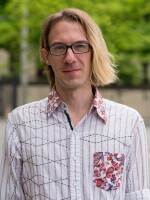Rupam Ghosh is on a mission of music. On the road for two months, the violinist travels only with his instrument, a suitcase and his connection to a network of musicians. His goal? Exposing audiences to North Indian classical music and the Hindustani musical traditions of his home.
"North Indian music is totally different from other music,” Ghosh said on Tuesday’s St. Louis on the Air. “Generation after generation, it goes through from the master to his disciples ... we have to listen and [remember it, with] no written script."
Among the central concepts of Hindustani music are “raga.” More than just a combination of notes, Ghosh said that raga must follow certain rules and structures of ascending and descending tones.
"I want to share this music, this culture, this philosophy to that new generation. Because while traveling all over the world, I am seeing the serious aggression, the restlessness of the youth,” he explained. “I'm trying to spread the Indian music, because Indian music has that power to establish peace and love."
Ghosh is making the most of his time in St. Louis. While he’s visiting, he’ll guest lecture a jazz theory class at Washington University, see a punk band at a converted convent in Belleville, record tunes at Clayton Studios, give a workshop at Parkway Central High School and eat plenty of Korean BBQ. He will also perform at the Chapel, Lindenwood University and Jack’s Joint at O’Connell’s Pub.
This is the second year that Ghosh has traveled the U.S. to spread Indian music. For this journey, he’s continuing to share his lifelong love for Hindustani music of North India — a love that’s come to define him on the road.
Part of that definition involves enormous humility. At last year’s Focal Point performance, tabla player Matt Pickart closed their first set with thanksgiving to Ghosh for the honor of learning beside him. The Indian master’s correction was short, swift and endearing: “Not learning, [just] sharing,” he interrupted.
Explaining that moment on today’s St. Louis on the Air, Ghosh insisted it was he who was in the company of experts. In his view, the group was simply sharing music, philosophy and culture.
Ghosh began the interview with a Hindustani incantation, a first for St. Louis on the Air. This chant is typically performed accompanied by the lulling strings of a — a fretless, sitar-shaped instrument used to supply a tonal center for the chant.
Learning classical music has traditionally been a private endeavor, one passed down by ear through ancient traditions from one generation to the next. Even sacred texts like the Vedas, Ghosh explained, were learned by sitting down in front of your master and listening, remembering and immersing oneself in a lifetime of wisdom. Sacred texts like the Vedas were chanted before they were written down, and the same mode of transmission was used with North Indian classic music.
Ghosh himself states he . His first studies were provided by Professor Robin Ghosh (no relation); his earliest exposure to the violin was through his father.
From British rule to more recent times, the Indian government on its professed value of teaching music in the classroom. Meanwhile, serious students and those who have the means to do so still seek out private mentors for their studies. At university levels, those studies often involve cohabitation .
Ben Wheeler, organizer of Violision, the St. Louis iteration of Ghosh’s tour, is appreciative of Ghosh’s gentle spirituality and what that means for the ensemble. “It’s definitely there,” he said.
“We’re barefoot onstage, and he’ll take his violin — and he’s sitting down — and he’ll open the case and kiss it and say a little prayer to himself and … it just frames the whole performance in a different way.”
Violision tabla player Sebastian Buhts also feels Ghosh’s extramusical energy.
“When we sit down to play music, he immediately touches his violin. And then he touches his forehead, and his heart. It just reminds me to be more mindful and thankful for the opportunity to make music with one another. It allows the entire performance to just be almost meditative and reflective, and I think that's really beautiful.”
You can see the four members of Violision perform this week. They are Rupam Ghosh (violin), Matt Pickart (violin), Sebastian Buhts (tabla) and Ben Wheeler (bass). Violision plays at the O’Connell’s Pub venue Jack’s Joint on Thursday evening and at the Chapel on Friday.
Related Events
What:
When: 8 p.m. April 13
Where: Jack’s Joint at O’Connells Pub (4652 Shaw Ave., St. Louis, MO 63110)
What: Violision performance at
When: 8 p.m. April 14
Where: 6238 Alexander Drive, St. Louis, MO 63105
“” brings you the stories of St. Louis and the people who live, work and create in our region. The show is produced by , , , and . is our production assistant. The audio engineer is . Send questions and comments about this story to talk@stlpr.org.






